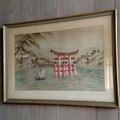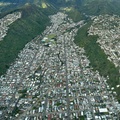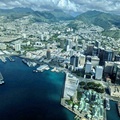It was late in the afternoon, almost five o’clock, when Dad and I dropped off Tanaka-san and Lynne, so I called Mom to tell her we were running late because, with freeway traffic in Honolulu, it could be a while before we were back at my parents’ place across town. As I merged onto the freeway, I couldn’t help but think about Lynne. How odd it was, her insisting on joining us for lunch. I really would have thought she’d have preferred having some unencumbered time to spend with her friends, catch a movie, or do some errands. It actually was quite peculiar. Did she really not trust me with her father?
Then it all dawned on me.
“Dad, when you called Tanaka-san last Sunday, what did you tell him?”
My father hesitated before answering. “I told him that we wanted to see him.”
“So you said that we wanted to see him, not that you wanted to see him.”
“Well, you wanted to see him too, right?”
“I did, but what exactly did you say when you called him?”
Dad then chuckled the laugh of someone who had just been caught red-handed eating the last piece of chocolate haupia pie. “I told him that you hadn’t seen Lynne in a while and wanted to visit them.”
“Oh geesh, Dad! Why the hell did you have to do that?”
“Well, wasn’t it good to see her, after all this time?”
“That’s not the point, and don’t make excuses. Why couldn’t you just apologize to Tanaka-san? Say you missed seeing him. Or just tell him you wanted to take him out to lunch. Why’d you have to involve me?”
Dad just sat there looking straight ahead, staring at the three lanes of traffic that were slowly snaking along the freeway. I know I should have dropped the matter but I was so annoyed. “Don’t you see that I must look like a total jerk to Lynne? There I was, driving off with Tanaka-san and you, and she had to come chasing down the street to join us. What must she think?”
Dad sat in silence, as the rush-hour traffic in Honolulu inched along. I was so irritated at him yet I also began to feel compassion, that he needed a ruse to pave the way to reconcile with his longtime friend. Finally, as he fidgeted in his seat, Dad added, “Well, if you feel so badly about Lynne, why don’t you call her to apologize?”
This only angered me more. “Why should I apologize?” I shot back, any sympathy I had been feeling toward my father quickly dissipating. “I didn’t do anything wrong. You’re the one who lied, not me.”
“You see,” Dad interrupted me, “so easy to tell other people to apologize, but not so easy when someone tells you to apologize, especially when you’re not the one who did anything wrong.”
Dad and I sat in silence, as I fought back the urge to say something because, really, what would be the point? I took the Likelike exit and, within a few more minutes, we had reached my parents’ house. As I undid my seat belt to get out of the car, I noticed that Dad wasn’t moving. He was motionless in his seat, looking straight ahead. “Thank you,” he said.
“Anytime,” I told him, wanting to get out of the car, but my father was still sitting there. “Dad, let me know if there are other people you wanna see too. I don’t mind driving wherever.”
“No,” he said, “I wasn’t talking about the driving.”
I must have looked at him with a puzzled expression, because he then reached over to gently pat my shoulder several times without saying anything. I then got it. “You mean about Lynne?”
“Yeah, about her. Thank you for taking one for the team.”
What an odd thing to say! Half of me wanted to laugh, but the other half was confused. By “team,” was he referring to just him and me, father and son? Or was he talking about his old poker gang, that he was thankful that they all could rest in peace knowing that the big rift between him and Tanaka-san was now mended? Or maybe it was both. As always, Dad was saying so much with such an economy of words. We sat there for a few more moments, until Dad slowly unbuckled his seat belt, got out of the car, and started up the steps to his home, a house that he could pay for in cash, thanks to the unequivocal trust of his poker gang. Before opening the kitchen door, he turned to look at me, as I was still sitting in the driver’s seat bemused. “Aren’t you coming?” he asked. “Dinner is probably getting cold.”
* * * * *
Just a couple months after our visit, Tanaka-san fractured his hip on a bad fall, requiring extensive surgery. While recovering in the hospital, he suffered a pulmonary embolism and passed quickly in the middle of the night. Ironically, Dad and I had plans to visit him the next morning.
His funeral was an intimate, simple service. His nephew read a touching eulogy, describing how his uncle would take him to baseball games at the old Honolulu Stadium, always treating him to a shave ice afterward. When the Honolulu Islanders had won, the shave ice would include a scoop of vanilla ice cream and a generous helping of azuki beans.
After the service, a few dozen of Tanaka-san’s relatives and close friends attended a reception where we could reminisce and exchange stories about him. I was surprised to learn that, in addition to being an expert carpenter, he was also an accomplished photographer, having won several amateur contests sponsored by the Honolulu Star-Bulletin. While my parents were engaged in a long conversation with Tanaka-san’s neighbors, I made my way to Lynne to express my condolences. I had also wanted to apologize for Dad’s recent ruse and the mix-up over lunch that day.
“Oh, I thought it was something like that,” she half-smiled.
“If only my dad could have been more upfront when he called your father. Anyway, I’m really sorry you had to chase us down the street.”
“That’s our dads, though, a totally different generation.”
“No kidding,” I shook my head. “Honestly, how hard would it have been for my father to say, ‘Hey, I haven’t seen you in a while. Let’s get together for lunch’? I’m just sorry you got dragged into this.”
“Don’t worry about it. I can easily see my father pulling something like that too. In a way, it’s almost kinda cute, those two,” she laughed.
“Well, as long as you think so,” I said, grateful that we could now find comedy in that awkward afternoon.
After the reception, it was such a beautiful, sunny day in Honolulu that I suggested to my parents that we take a drive around the city, maybe head up to Tantalus to enjoy the spectacular view of the city, but Mom said she preferred going straight home to take a nap before dinner so I took the quickest route to their place. As I was driving up their gravel driveway, Dad asked if I was busy the rest of the afternoon. “Why?” I asked, “Do you need help with something?”
He didn’t say anything until I drove into their garage. “Come,” he motioned as he got out of the car. While Mom headed into the house, Dad made his way to that corner of the garage where his poker table was still leaning against the wall. “Do you think this will fit in your trunk if we snap down the backseats?”
I looked at the back of my SUV. “Sure, we can fold and tilt the table sideways, and if it sticks out a bit we can always tie the tailgate down. But where are we bringing it?”
Dad smiled and then explained how he had found the perfect home: the clubhouse of the 100th Infantry Battalion Veterans. “I called them yesterday and they said they’d be happy to accept the donation.” As I helped my father roll the poker table to the rear of my SUV, fold it in half, and hoist it into the back, I asked him where exactly the clubhouse was.
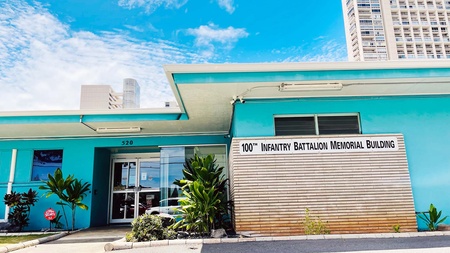
“You know, near Iolani School across from the football field.”
“Right along the Ala Wai Canal?”
“No, not along the canal. Don’t you know where? It’s off Kapiolani Boulevard near the Ala Wai Elementary School.”
My confused expression made my father stop what he was doing, the poker table balancing on my SUV’s rear bumper, as he dug into his memory. “You mean I’ve never brought you there before?” he asked. I shook my head as we continued loading the precious cargo.
On the way to the clubhouse, we were stuck in a traffic jam on the H-1 freeway when my father asked again, “Are you sure you’ve never been there before?”
“Dad, I didn’t even know there was a clubhouse.”
“How can this be?”
We sat in silence for a few more minutes, crawling along the heavy traffic, which had funneled from three lanes to two because of a stalled car ahead. I was deep in my thoughts, wondering if Dad might have indeed taken me to the clubhouse long ago when I was too young to register its significance. I might not have even known then about the heroic exploits of my father’s former infantry unit.
Interrupting my thoughts, Dad said, “I really should have brought you before. I don’t know why I didn’t. Well, better late that never.” Silence for a few more minutes, as the traffic slowly lessened with the two lanes expanding back into three.
“Dad, what exit should I take, Bingham Street or U.H.?”
“Either one is okay. No rush, right? And if you have time, I’ll show you around the place.”
“Oh yeah, that would be great.”
“Maybe I can introduce you to some folks there, too.”
I smiled as I took the Bingham Street exit, resisting the urge to tell my father something I was sure he already knew — that, actually, I’ve always had the time for him to tell me the things he wanted to, even when it might have appeared that I was too busy with the daily grind of my own life. But I also didn’t want to rush him. As always, my father would tell me only what he chose to, and I’d have to listen closely to the things he couldn’t talk about, because only then would I be able to hear what he was really trying to say.
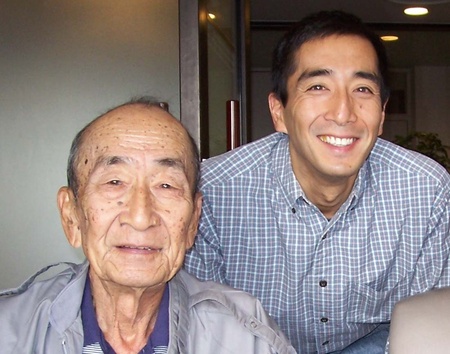
*“The Poker Table” was originally published in The Gordon Square Review (issue 12).
© 2023 Alden M. Hayashi


